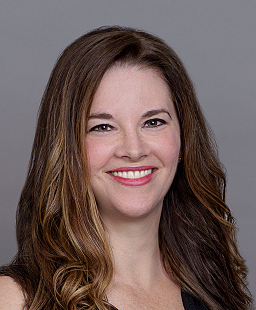Silicon Valley corporate lawyer Valeska Pederson Hintz joined Perkins Coie’s emerging companies and venture capital practice in Austin as a partner this month.
Hintz was previously at Lowenstein Sandler, where she practiced for seven years. Her career has also included stops at Wilson Sonsini, Latham & Watkins and Cooley.

With the move, Hintz returns to the home of her high school and college alma maters, St. Stephen’s Episcopal School and the University of Texas, where she received a business degree in electrical engineering and financial management.
Hintz’s practice focuses on venture financings, initial public offerings, tender offers, corporate governance, M&A transactions and SPAC transactions. She has also developed an expertise in blockchain technologies and provides counsel on non-fungible tokens, token offerings and cryptocurrency regulation and adoption.
“Valeska’s familiarity with guiding innovative technology companies and entrepreneurs will be highly valuable to our sophisticated clients as they increasingly adopt technology-related platforms and applications,” Troy Foster, co-chair of Perkins Coie’s Emerging Companies & Venture Capital practice, said in a statement.
Perkins Coie is expected to move soon into new office space in downtown Austin at 405 Colorado St.
Hintz talked with The Texas Lawbook in this Q&A about returning home and elaborated on what she is observing in the ECVC and blockchain spaces.
The Lawbook: Why did you decide to join Perkins Coie?
Valeska Hintz: I grew up in Texas, graduated from St. Stephen’s Episcopal High School and from The University of Texas at Austin. My husband is from Houston. When we moved back home, we wanted to be part of the community. For me, that also means being part of the tech and biotech business communities in Texas. I want to be at the firm that best supports that. Perkins has offices in Dallas and Austin and is dedicated to, not just Austin, but the whole Texas market. It’s also a premier tech and bio firm that has incredibly strong West Coast and East Coast presences and deep connections to the investors and companies on the coasts. That expertise and those connections will be invaluable for our Texas clients.
The Lawbook: Are you moving from Silicon Valley to Austin? If so, how is the move going?
Hintz: Yes, we recently moved from Silicon Valley to Austin this past summer. The move is going great. It’s nice to be back home close to family. It’s also really nice to be more plugged into the Texas business ecosystem. I’m loving it.
The Lawbook: What are the emerging trends or key developments in the ECVC space? What about blockchain?
Hintz: The ECVC space has been really busy during the pandemic. During that time, you’ve seen the explosive growth of SPACs and subsequent decline of that type of deal. You’ve also seen the continuance of late stage private companies continuing to get bigger, resulting in more unicorns, and of more players coming into the field. More individuals are becoming interested in angel investing in tech and biotech companies, and more family offices and private equity investors are investing in ECVC deals. Also, there are new players in the venture debt space. Overall ECVC has just been really busy and getting increasingly more so.
Blockchain has moved on from initial coin offerings to non-fungible tokens. However, what we have not seen is a change in the regulatory environment.
[Gary] Gensler replaced [Jay] Clayton, but that didn’t come with a more friendly stance toward crypto regulation. If you listened to Gensler’s speech at the Securities Enforcement Forum on Nov. 4, 2021, that was very clear. He started out by quoting the first SEC Chair saying, “The Commission will make war without quarter on any who sell securities by fraud or misrepresentation.” He goes on to talk about decentralized finance (DeFi) and makes it clear that the SEC will be looking at the economic realities of a given crypto product or arrangement to determine whether it complies with the securities laws. He then advises people, who are reaching out to their attorneys to see if something is over the line, to step back from the line, reminding them not to search for ambiguity but to consider that the spirit of the law is to protect investors. His final remarks in the speech echoed those of his predecessor. He addressed the lawyers, auditors, bankers and investment advisors, reminding these market participants that we have an important role in upholding the law as the first line of defense.
I think regulation will continue to be the trend in crypto.
The Lawbook: What is keeping your clients up at night?
Hintz: Prior to the pandemic, many of my clients were experiencing difficulties hiring talent. The cost of salaries for certain engineering talent, like software programmers and data scientists, was really high, and the big companies were hiring away a lot of talent. Office space was also very expensive. Many board meetings included headquarter relocation or secondary offices as a topic of strategic importance. Although the cost of office space has declined, inflation has resulted in an increase in compensation costs.
The war for talent has also increased, and employees are more likely than ever to resign, leave the workforce or pick a different career. Now the Great Resignation is what’s keeping my clients up at night. Management needs to keep star employees happy, attract new talent in a hypercompetitive market and maintain culture.
Management is worried about the willingness of their workforces to go back to the office or the need for office space at all. Clients that are losing talent during the Great Resignation are concerned about replacing those people. Clients that are growing quickly and gaining people as a result of their flexible work or remote work policies are worried about maintaining culture with dispersed, new workers that have never all been together in person. Clients that are allowing people to work remotely from many locations are dealing with an increase in compliance costs related to local and international employment, tax and securities laws.
